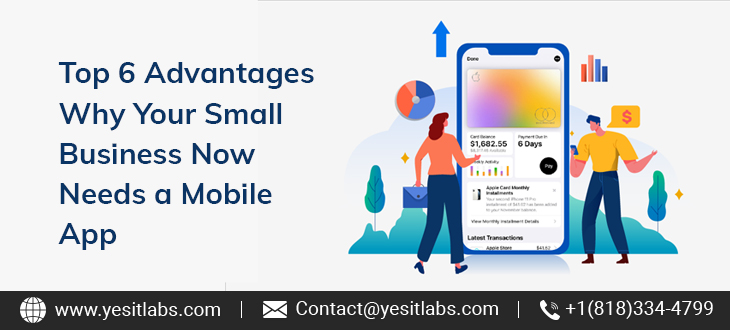In today’s digital-first world, mobile apps have become a necessity for businesses of all sizes, not just large corporations. Small businesses can leverage mobile applications to enhance brand visibility, engage customers, and drive revenue. With more than 6.6 billion smartphone users worldwide, having a mobile app is no longer optional—it’s essential.
A mobile app gives your business a direct marketing channel, increases customer loyalty, and boosts sales like never before. Whether you’re running a local bakery, a consulting firm, or an eCommerce store, a well-designed app can transform how you connect with your customers.
This article explores six powerful advantages of having a mobile app and how it can future-proof your small business.
1. Be Visible to Customers at All Times
The Power of Mobile Presence
The average American spends over three hours a day on their smartphone, engaging with various apps and services. Even if users are not actively using your app, its presence on their device significantly boosts brand recall. Each time they unlock their phone, navigate through apps, or receive a push notification, your brand subtly reinforces its presence in their daily routine. This passive yet powerful exposure helps establish trust, increases engagement, and ensures that your business remains top of mind when users need your products or services.
How This Translates to Business Growth
- Your app acts as a constant reminder of your services.
- Push notifications allow instant communication with users.
- In-app promotions can drive sales directly from mobile users.
Having a mobile presence builds familiarity, which eventually leads to trust and customer loyalty.
2. Boost Your Sales with Mobile Commerce
Why Mobile Apps Drive Revenue
Mobile applications provide a frictionless way for customers to make purchases, book appointments, and request services at their convenience. With the rise of mobile wallets, one-click payments, and AI-driven shopping experiences, mobile commerce has transformed how consumers interact with businesses.
According to Statista, mobile commerce accounted for 73% of total eCommerce sales in 2023(Source), and this trend is expected to continue growing. Businesses that invest in mobile applications see an average increase of 25-40% in sales, thanks to enhanced customer engagement, streamlined checkout processes, and personalized shopping experiences. Additionally, features such as in-app exclusive discounts and loyalty rewards further incentivize repeat purchases, making mobile apps a crucial tool for driving revenue and sustaining long-term business growth
How a Mobile App Increases Revenue
- Push Notifications: Alert users about flash sales, discounts, and new arrivals.
- One-Tap Payments: Secure, hassle-free transactions with saved payment methods.
- Personalized Recommendations: AI-driven product suggestions based on user behavior.
By investing in app development for companies, businesses can provide a seamless shopping experience, leading to higher conversions and repeat customers.
Also know about the total cost breakdown to build a mobile app for your business.
3. Strengthen Brand Awareness & Customer Engagement
Brand Recognition in the Digital Age
Your mobile app serves as a direct representation of your brand and acts as a powerful branding tool. A well-designed app with a consistent color scheme, intuitive navigation, and engaging content enhances credibility and fosters customer trust.
Moreover, a dedicated mobile presence reinforces brand identity, ensuring that customers associate your business with a seamless, high-quality digital experience. An app that is visually appealing and easy to use increases the likelihood of higher user retention and word-of-mouth referrals.
Customer Engagement & Retention
Unlike websites that require users to take the initiative to visit, mobile apps allow businesses to engage customers in real-time. Features such as live chat support, loyalty programs, and in-app messaging create a more interactive experience, helping businesses build stronger relationships with their audience.
In-app surveys, exclusive app-only promotions, and personalized notifications further enhance engagement, keeping users actively involved with your brand. Additionally, push notifications with relevant offers and updates can boost re-engagement rates by up to 60%.
Pro Tip: Integrate your app with social media channels to encourage seamless sharing, real-time reviews, and the development of an online community. This enhances your brand’s visibility and fosters organic user acquisition.
4. Build Customer Loyalty with Personalized Experience
Why Personalization Matters
Customers appreciate personalized experiences. Mobile apps allow you to collect valuable user data to offer tailored content, product recommendations, and exclusive offers. By analyzing user behavior, preferences, and past interactions, businesses can create hyper-personalized experiences that enhance customer satisfaction and increase engagement.
Moreover, AI-powered algorithms can predict user needs, providing proactive recommendations and ensuring a seamless, intuitive experience. This level of personalization helps build stronger customer relationships, fostering long-term loyalty and higher retention rates.
Features That Increase Customer Loyalty
- Loyalty Rewards: Offer points and discounts for frequent app usage.
- Exclusive Offers: Provide app-only deals to encourage more downloads.
- Automated Reminders: Send push notifications for abandoned carts, upcoming sales, or special events.
By investing in application development for iPhone, businesses can leverage Apple’s ecosystem to enhance personalization through AI-powered recommendations and predictive analytics.
5. Future-Proof Your Business with Technology
Staying Ahead of Competitors
Technology is evolving rapidly, and businesses that embrace mobile apps early position themselves for long-term success. A well-developed mobile app not only enhances customer experience but also streamlines operations, improves communication, and drives revenue.
Businesses that integrate mobile apps into their strategy gain a competitive advantage by offering personalized services, real-time engagement, and seamless transactions, setting themselves apart from competitors still relying on traditional marketing channels.
As emerging technologies like AI, IoT, and AR continue to shape the mobile landscape, businesses that adapt now will be better prepared for future advancements, ensuring sustainability and growth in an increasingly digital marketplace.
Emerging Trends in Mobile Apps
- AI and Chatbots: Improve customer service with 24/7 AI-driven support.
- IoT Integration: Connect smart devices for enhanced automation.
- Augmented Reality (AR): Allow customers to try products virtually before purchasing.
A mobile app not only benefits your business today but positions you for future advancements in digital technology.
Know more about this through our blog on multiplatform app development and its impact
6. Create a Direct Marketing Channel for Instant Communication
Why Direct Marketing Matters
A mobile app eliminates third-party platforms and gives businesses direct access to their customers. Unlike email marketing, which has a low open rate (20%), push notifications boast an impressive open rate of 90%. This means businesses can instantly communicate with their audience, ensuring that important updates, promotional offers, and personalized recommendations reach users in real-time.
Additionally, mobile apps allow businesses to leverage in-app messaging, loyalty programs, and automated customer engagement strategies to foster deeper connections with their audience. This enhanced communication leads to increased customer satisfaction, higher conversion rates, and a more streamlined marketing approach without reliance on social media algorithms or email spam filters.
Benefits of a Mobile App as a Marketing Tool
- Instant Promotions: Deliver exclusive deals directly to users.
- Surveys & Feedback: Collect real-time customer insights.
- Geo-Targeting: Send location-based offers to nearby customers.
Having an app means you control your marketing strategy without relying on social media algorithms or email deliverability.
Conclusion
The benefits of mobile apps for small businesses are undeniable. They serve as a powerful tool to enhance brand awareness, increase sales, and ensure long-term business success in an increasingly digital world. A mobile app can streamline customer interactions, improve engagement, and provide a seamless shopping experience that modern consumers expect.
If you’re ready to take your business to the next level, investing in app development for companies can provide a significant competitive advantage by offering personalized services, boosting customer retention, and increasing revenue streams.







